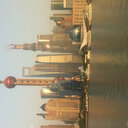Comparison of the efficacy and safety of EFGR tyrosine kinase inhibitor monotherapy with standard second-line chemotherapy in previously treated advanced non-small-cell lung cancer: a systematic review and meta-analysis.
キーワード
概要
OBJECTIVE
To compare the efficacy and safety of epidermal growth factor receptor tyrosine kinase inhibitor monotherapy (EFGR-TKIs: gefitinib or erlotinib) with standard second-line chemotherapy (single agent docetaxel or pemetrexed) in previously treated advanced non-small-cell lung cancer (NSCLC).
METHODS
We systematically searched for randomized clinical trials that compared EGFR-TKI monotherapy with standard second-line chemotherapy in previously treated advanced NSCLC. The end points were overall survival (OS), progression-free survival (PFS), overall response rate (ORR), 1-year survival rate (1-year SR) and grade 3 or 4 toxicities. The pooled hazard ratio (HR) or risk ratio (RR), with their corresponding 95% confidence intervals (CI) were calculated employing fixed- or random-effects models depending on the heterogeneity of the included trials.
RESULTS
Eight randomized controlled trials (totally 3218 patients) were eligible. Our meta-analysis results showed that EGFR-TKIs were comparable to standard second-line chemotherapy for advanced NSCLC in terms of overall survival (HR 1.00, 95%CI 0.92-1.10; p=0.943), progression-free survival (HR 0.90, 95%CI 0.75-1.08, P=0.258) and 1-year-survival rate (RR 0.97, 95%CI 0.87-1.08, P=0.619), and the overall response rate was higher in patients who receiving EGFR-TKIs(RR 1.50, 95%CI 1.22-1.83, P=0.000). Sub-group analysis demonstrated that EGFR-TKI monotherapy significantly improved PFS (HR 0.73, 95%CI: 0.55-0.97, p=0.03) and ORR (RR 1.96, 95%CI: 1.46-2.63, p=0.000) in East Asian patients, but it did not translate into increase in OS and 1-year SR. Furthermore, there were fewer incidences of grade 3 or 4 neutropenia, febrile neutropenia and neurotoxicity in EGFR-TKI monotherapy group, excluding grade 3 or 4 rash.
CONCLUSIONS
Both interventions had comparable efficacy as second-line treatments for patients with advanced NSCLC, and EGFR-TKI monotherapy was associated with less toxicity and better tolerability. Moreover, our data also demonstrated that EGFR- TKI monotherapy tended to be more effective in East Asian patients in terms of PFS and ORR compared with standard second-line chemotherapy. These results should help inform decisions about patient management and design of future trials.





